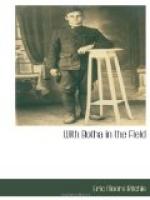On June 26 Headquarters arrived at Okanjande, and pushed through to Otjiwarongo, arriving there at 12 noon. The pace of the trekking was now becoming phenomenal, and though the country was quite good, water was as scarce as ever, the bush being intensely dense, with thick sweet grass as much as eight feet high in places. It was a country made for ambushes. In less than a week General Botha had trekked over one hundred and twenty miles, the distance from Karibib to Otjiwarongo. During this trek the army had had water only twice on the stretch from Omaruru. But delay of any kind was now highly undesirable: the columns could not afford to pause long owing to the consumption of rations. It was no part of the Commander-in-Chief’s policy to make bases and await the arrival of large supplies; water was uncertain, and congestion of columns at the watering places had to be avoided as much as possible.
Near Okanjande the first great development in General Botha’s final strategy occurred. The northern advance was being conducted as follows. Brigadier-General Brits, on the left, remained at Otjitasu, leaving it on June 30. General Botha, with his command, in the centre, was holding to the narrow gauge Karibib-Otavi-Tsumeb-Grootfontein Railway, and General Myburgh’s column to the right. Brigadier-General Brits now branched away to Otjitasu, making for Outjo, Okanknejo, and across the Etoscha Pan to Namutoni. The other columns moved on, trekking night and day, as in the great advance across the Namib Desert.
Headquarters made Okaputa on June 29; paused the next day, and on July 1 the Staff, leaving Okaputa at 8 o’clock in the morning, reached Otavi and Otaviafontein at 4.30 p.m., close on the heels of an engagement at Osib between the Germans and Brigadier-General Manie Botha, who had pushed on with the Orange Free State Brigade at 6.30 the previous evening, June 30. This engagement took place in the now intensely thick bush country. In defeating the enemy, at a cost of a dozen casualties, Brigadier-General Manie Botha succeeded in securing the finest water supply the Union Forces had yet seen, and so swift and resolute was the fighting of the burghers that the enemy fled to their last strong-hold northward towards Tsumeb. Before striking the enemy in this action the Free State Brigade, and their accompanying batteries from the 2nd South African Mounted Riflemen, had trekked forty-two miles in sixteen hours without halt for any kind of a rest. Behind them, in support, came the force, consisting of the 6th Mounted Brigade, with the 1st South African Mounted Riflemen Batteries, who did a similar trek, through thickest bush, covering almost fifty miles in twenty hours. And the animals had come through from Karibib—almost two and a half degrees of latitude south.




